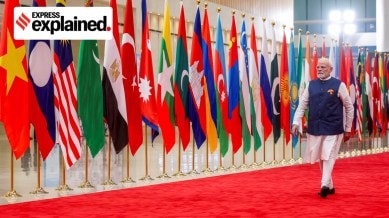Explained: Significance of Pahalgam reference in SCO’s Tianjin declaration
‘Member States strongly condemned the terrorist attack in Pahalgam,’ the joint statement issued at the end of the SCO leaders’ summit said

Leaders of the Shanghai Cooperation Organisation (SCO) issued a joint-declaration on Monday (September 1) which, among other things, strongly condemned the terrorist attack in Pahalgam on April 22.
“The Member States strongly condemn terrorism in all its forms and manifestations… Member States strongly condemned the terrorist attack in Pahalgam… They expressed their deepest sympathy and condolences to the families of the dead and the wounded. They further stated that perpetrators, organisers and sponsors of such attacks must be brought to justice,” the Tianjin declaration said.
The statement also condemned the Jaffer Express (March) and Khuzdar (May) terrorist attacks in Balochistan, Pakistan.
Departure from defence ministers’ meet
The explicit mention of the Pahalgam attack, in which 26 people lost their lives, is significant.
In June, Pahalgam had failed to find a mention in the draft declaration of the defence ministers’ level meeting of the SCO in Qingdao. The statement, however, had mentioned the highjacking of the Jaffer Express.
Defence Minister Rajnath Singh refused to sign the statement. “India wanted concerns on terrorism to be reflected in the document, which was not acceptable to one particular country (Pakistan), and therefore, the statement was not adopted,” Ministry of External Affairs (MEA) spokesperson Randhir Jaiswal said in a press briefing after the summit.
Singh’s speech in Qingdao did not explicitly mention Pakistan but said that “those who sponsor, nurture and utilise terrorism for their narrow and selfish ends must bear the consequences”. He said: “Some countries use cross-border terrorism as an instrument of policy and provide shelter to terrorists… SCO should not hesitate to criticise such nations”.
Three months later, the joint-declaration of the SCO leaders’ summit in Tianjin not only mentions the Pahalgam terror attack, it also explicitly states the need to “combat terrorism, including cross-border movement of terrorists” although it stops short of making any reference to Pakistan.
Context of China’s past actions
The Tianjin declaration’s reference to Pahalgam is also notable in context of China’s historical proclivity of using its clout in international fora to shield Pakistan from criticism, and actively impeding anti-terror efforts which might implicate the country Beijing refers to as its “all-weather friend”.
For instance, China blocked the listing of Jaish-e-Mohammad chief Masood Azhar to the UN Security Council’s ‘ISIL (Da’esh) and Al-Qaida Sanctions List of Individuals and Entities’ for more than a decade. It lifted its technical objection in 2019 after years of diplomatic efforts by India and Western countries such as France, the UK, and the US.
The Indian Express had reported at the time: “A key Chinese concern was to minimise its perceived reputational costs before the international community. For a country aspiring for global leadership, it is bad optics to be seen as protecting, in defiance of a global consensus, a single individual who is responsible for so many terrorist actions”.
In June 2023, China also blocked a proposal by the US and co-designated by India to blacklist Sajid Mir as a global terrorist under the UNSC Al Qaida Sanctions Committee. This would have subjected Mir, a commander of the Lashkar-e-Taiba and among the chief planners of the November 2008 terrorist attacks in Mumbai, to an assets-freeze, travel-ban, and arms embargo.
During the defence ministers’ meeting in June, New Delhi felt that China had once again leveraged its influential position in the SCO to aid Pakistan, a country which it also supported diplomatically and materially during Operation Sindoor, India’s military response to the Pahalgam attack.
But entering the leaders’ summit in Tianjin, relations between New Delhi and Beijing appeared to be on the mend. Prime Minister Narendra Modi made his first trip to China in more than seven years to meet Chinese President Xi Jinping on the sidelines of the summit.
The explicit mention of Pahalgam in the joint statement may be seen as yet another signal of Beijing’s keenness to strengthen ties with New Delhi.
Pakistan still China’s ‘all-weather friend’
That said, the Tianjin declaration did not make any reference to Pakistan or its role in fomenting terrorism in India. It also mentioned the Jaffer Express hijacking near Querra, in which more than 60 people lost their lives, and the bombing of a school bus in Khuzdar, in which 11 people lost their lives.
As such, the Tianjin declaration alone in no way changes the Pakistan-China dynamic. After all, China has huge geostrategic and economic stakes in Pakistan, and is heavily invested in the China-Pakistan Economic Corridor, a part of Xi’s Belt and Road Initiative.
As India and China push to strengthen ties, in part under pressure from Donald Trump’s expansive tariff regime, several geopolitical and strategic issues remain unresolved between the two. Beijing will have to do much more to assuage New Delhi’s concerns.